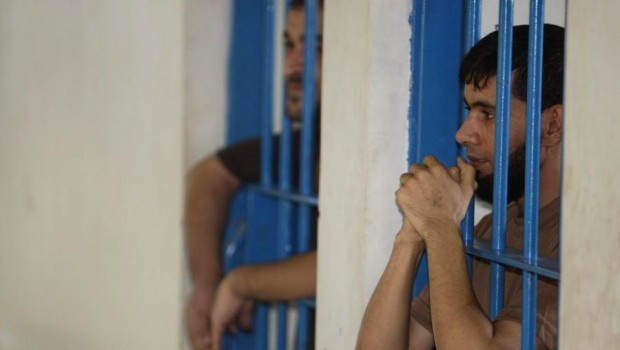
File photo of prison inmates in an Iraqi jail in Nassiriyah. (Atef Hassan/Reuters)
Dhi Qar, Iraq, Asharq Al-Awsat—The Iraqi government has suspended the execution of non-Iraqi Arab prisoners in a step aimed at preventing a backlash against Iraqi nationals abroad, Justice Minister Hassan Al-Shammari said on Friday.
In comments to Asharq Al-Awsat, Shammari said: “Carrying out these [death] sentences could lead to dangerous consequences for Iraqis based in these countries.” He added that Baghdad had made some exceptions, notably the recent execution of a Tunisian national convicted of bombing the Al-Askari Mosque in Samarra, as well as a Libyan national also convicted on terror charges.
The justice minister said that the majority of Arab detainees in Iraqi prisons were from countries that have recently witnessed political turmoil. “Around 1,200 detainees in Iraq, including both men and women, have been sentenced to death on criminal and terrorism charges. Of this number, there are approximately ten [non-Iraqi] Arab or other foreign nationals who have been sentenced to death.”
According to the justice minister, there are approximately 70 Saudi nationals in the Iraqi prison system, including five who have been sentenced to death.
Fears are on the rise regarding the security of Iraq’s jails after Al-Qaeda-affiliated groups staged coordinated attacks on Abu Ghraib and Taji prisons last year, resulting in the escape of approximately 500 radical Islamist prisoners.
Baghdad also took the decision this month to close the notorious Abu Ghraib prison amid security concerns, after the Islamic State of Iraq and Syria (ISIS) gained control of a strategically important dam on the Euphrates River south of Fallujah. ISIS blocked the flow of water through the dam, flooding areas between Fallujah and Baghdad, including Abu Ghraib.
Responding to a question regarding who is responsible for the security breaches in Iraq’s prisons, Shammari said that the Justice Ministry was not responsible and is only in charge of “purely civil and administrative” issues. The Ministry of the Interior is responsible for the security of the country’s prisons, he said. “In my estimation there has been some collusion by security leaders and officials in the interior ministry,” the Justice Minister told Asharq Al-Awsat.
As a part of a broad security campaign, Iraqi authorities have “conclusively shut down Abu Ghraib prison, with all inmates being transferred to prisons in the Kurdistan region and central Baghdad.”
“As for Taji prison, we cannot transfer all its inmates . . . but detainees convicted of terror charges will be transferred,” he added.
